Reading List
I love books! Here are some of my recent favourites:
- The Laws of Human Nature - Robert Greene
- Courage is Calling - Ryan Holiday
- A Peace to End All Peace - David Fromkin
- Siddhartha - Herman Hesse
- The Alchemist - Paulo Coelho
- The Four Agreements - Don Miguel Ruiz
- Can't Hurt Me - David Goggins
- Being and Time - Heidegger
- Plato's Republic
- The Count of Monte Cristo - Alexandre Dumas
- Leonardo Da Vinci - Walter Isaacson
- The Foundation Series - Asimov
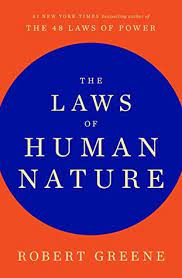 Robert Greene is my absolute favourite author. This book is an incredible portal into human nature. So often we are locked in our own ways and stuck in our own heads. We fail to notice the people around us. We barely know our friends and family, and more gravely, we barely know ourselves. This book provides tools to observe ourselves and the people around us in order to be more connected. The stories and annecdotes from history in this book are captivating and inspiring. I highly recommend it.
Robert Greene is my absolute favourite author. This book is an incredible portal into human nature. So often we are locked in our own ways and stuck in our own heads. We fail to notice the people around us. We barely know our friends and family, and more gravely, we barely know ourselves. This book provides tools to observe ourselves and the people around us in order to be more connected. The stories and annecdotes from history in this book are captivating and inspiring. I highly recommend it.
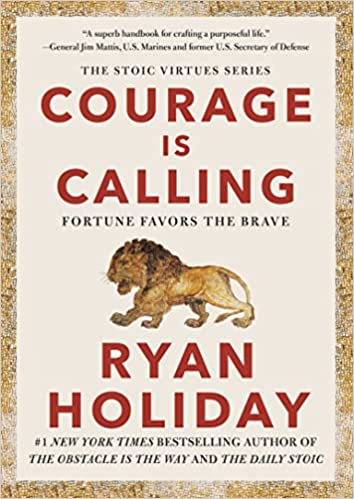 Holiday uses Stoic philosophy to teach us how to be courageous in a practical everyday way. The stoics were incredible people that lived over 2000 years ago, but their philosophy is still relevant. They believed in the virtues of Courage, Temperance, Justice, and Wisdom. Sometimes the biggest changes in life just take 20 seconds of embarrassing courage. Holiday tries to get us to make a habit of it.
Holiday uses Stoic philosophy to teach us how to be courageous in a practical everyday way. The stoics were incredible people that lived over 2000 years ago, but their philosophy is still relevant. They believed in the virtues of Courage, Temperance, Justice, and Wisdom. Sometimes the biggest changes in life just take 20 seconds of embarrassing courage. Holiday tries to get us to make a habit of it.
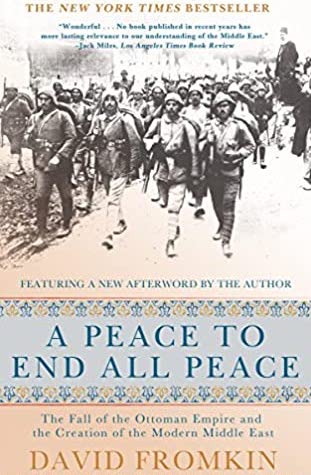 For the history nerds this is an epic book. Fromkin goes behind the scenes to show the political games that were going on during and after World War I, which shaped the Modern Middle East. The amount of deception, incompetnece, and misinformation is very relevant to our modern political times. Fromkin wraps this history around Winston Churchill as a central figure. Churchill is not the hero we know him to be now at this time, and was largely blamed for most of the problems during this time.
For the history nerds this is an epic book. Fromkin goes behind the scenes to show the political games that were going on during and after World War I, which shaped the Modern Middle East. The amount of deception, incompetnece, and misinformation is very relevant to our modern political times. Fromkin wraps this history around Winston Churchill as a central figure. Churchill is not the hero we know him to be now at this time, and was largely blamed for most of the problems during this time.
 Siddhartha is a story of self-discovery. I have read this book multiple times and I always come away with something different and beautiful. A couple concepts have really stayed with me. For one, Siddhartha reminds us not to be afraid of getting lost in the chaos of life in order to find ourselves. He challenges us to let go of our vanity, pride, and any reputation we hold onto. However, the story of Siddhartha shows us that we will fail to do so, and that in failing to do so, we will find the key to our self-discovery.
Siddhartha is a story of self-discovery. I have read this book multiple times and I always come away with something different and beautiful. A couple concepts have really stayed with me. For one, Siddhartha reminds us not to be afraid of getting lost in the chaos of life in order to find ourselves. He challenges us to let go of our vanity, pride, and any reputation we hold onto. However, the story of Siddhartha shows us that we will fail to do so, and that in failing to do so, we will find the key to our self-discovery.
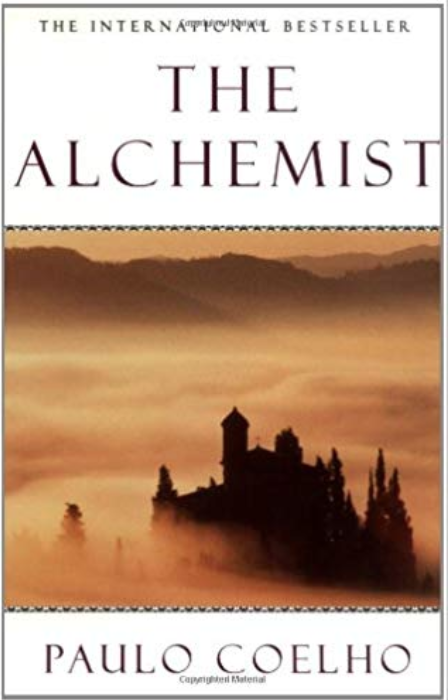 This story is for those that have a bit of magical realism in their lives. It is a beautiful story about a Spanish shepherd who goes on a journey to achieve his Personal Legend - his dream in life. Along the way the shepherd realizes that although he is tested continously before achieving his goal, the whole universe seems to be conspiring to help him achieve it. This story is about listening to your dreams and living the path that leads you to them. What's beautiful is that Coelho urges us to live with love and not fear, and to listen to our own innermost desires.
This story is for those that have a bit of magical realism in their lives. It is a beautiful story about a Spanish shepherd who goes on a journey to achieve his Personal Legend - his dream in life. Along the way the shepherd realizes that although he is tested continously before achieving his goal, the whole universe seems to be conspiring to help him achieve it. This story is about listening to your dreams and living the path that leads you to them. What's beautiful is that Coelho urges us to live with love and not fear, and to listen to our own innermost desires.
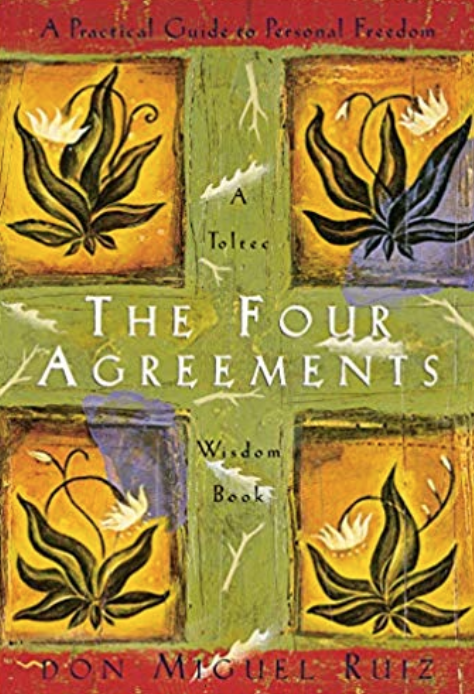 Don Miguel lays out four simple agreements that he argues will grant you your own personal liberation. The four agreements are: 1) Be impeccable with your word. 2) Don't take anything personally 3) Don’t make assumptions. 4) Always do your best. These are really powerful but difficult agreements. Don Miguel challenges you to live your life not fearing if you will be accepted or loved. He challenges you to be yourself, and to accept yourself. These are all really simple ideas but difficult to put in action. The only way is by making them a habit.
Don Miguel lays out four simple agreements that he argues will grant you your own personal liberation. The four agreements are: 1) Be impeccable with your word. 2) Don't take anything personally 3) Don’t make assumptions. 4) Always do your best. These are really powerful but difficult agreements. Don Miguel challenges you to live your life not fearing if you will be accepted or loved. He challenges you to be yourself, and to accept yourself. These are all really simple ideas but difficult to put in action. The only way is by making them a habit.
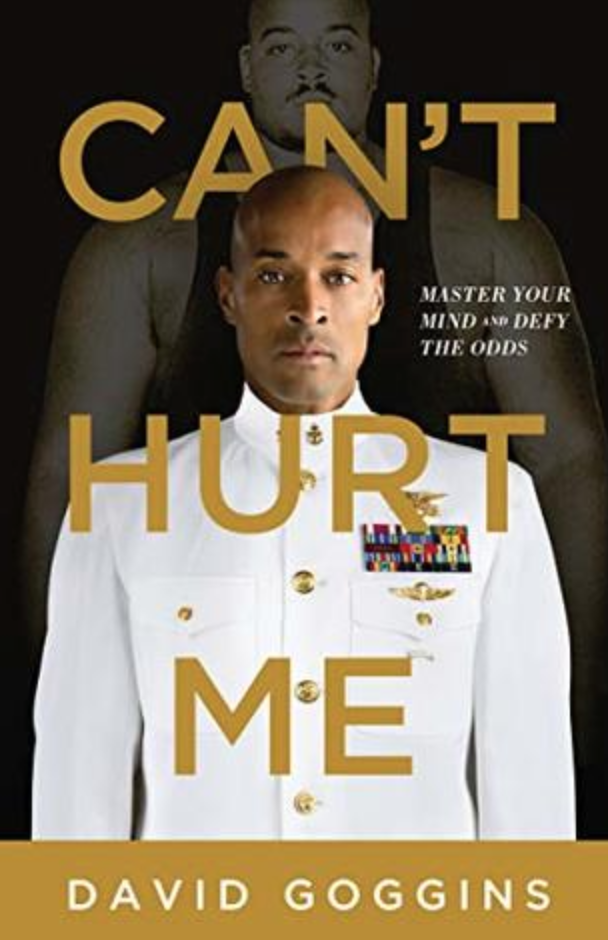 The story of David Goggins is incredible. This man was given almost no lucky breaks in his childhood. He had a learning disability, a stutter and his family was a nightmare. But he found a way to overcome all those obstacles and to transform his mind. He did so through discipline, and hard work and the belief that he could always give more. What Goggins teaches us most of all is that we are not doing nearly as much as we could be. Our limits are much higher than we perceive them to be. It suffices to wake up every day and place yourself in uncomfortable situations and try to overcome them. By doing this Goggins argues that you callus your mind and you become unstoppable.
The story of David Goggins is incredible. This man was given almost no lucky breaks in his childhood. He had a learning disability, a stutter and his family was a nightmare. But he found a way to overcome all those obstacles and to transform his mind. He did so through discipline, and hard work and the belief that he could always give more. What Goggins teaches us most of all is that we are not doing nearly as much as we could be. Our limits are much higher than we perceive them to be. It suffices to wake up every day and place yourself in uncomfortable situations and try to overcome them. By doing this Goggins argues that you callus your mind and you become unstoppable.
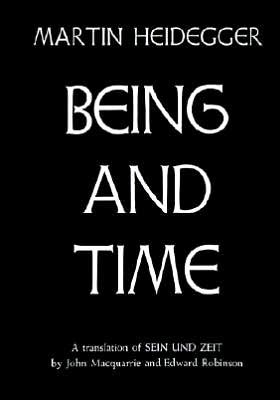 Being and Time might be the book that has changed the way I think the most. At the surface, it is easy to get frustrated by Heidegger, because he is so verbose, so repetitive, and so intent on using his own specific meanings for certain words. However, this is all key to thinking through the problems he challenges us with, and the challenges are well worth it. Heidegger shook philosophy the same way that quantum theory shook physics, and it is no coincidence that these two theories came about at the same time in the same country. Heidegger challenges us to think about how we experience time and challenges us to face the essence of our being.
Being and Time might be the book that has changed the way I think the most. At the surface, it is easy to get frustrated by Heidegger, because he is so verbose, so repetitive, and so intent on using his own specific meanings for certain words. However, this is all key to thinking through the problems he challenges us with, and the challenges are well worth it. Heidegger shook philosophy the same way that quantum theory shook physics, and it is no coincidence that these two theories came about at the same time in the same country. Heidegger challenges us to think about how we experience time and challenges us to face the essence of our being.
 Plato's republic provides so many important insights and conclusions. From the analogy of the virtue of man to the virtue of a politic to the escaping of the cave of darkness to the light of the good, and the golden lie that all societies are built on. But one of the most interesting ideas, which I have not been able to fully understand, is that Plato ultimately rests his idea of virtue and morality on the basis of the after life. After all the logical games that Socrates plays in this book, the final argument is based on being good for the sake of the afer life, or for the irrational.
Plato's republic provides so many important insights and conclusions. From the analogy of the virtue of man to the virtue of a politic to the escaping of the cave of darkness to the light of the good, and the golden lie that all societies are built on. But one of the most interesting ideas, which I have not been able to fully understand, is that Plato ultimately rests his idea of virtue and morality on the basis of the after life. After all the logical games that Socrates plays in this book, the final argument is based on being good for the sake of the afer life, or for the irrational.
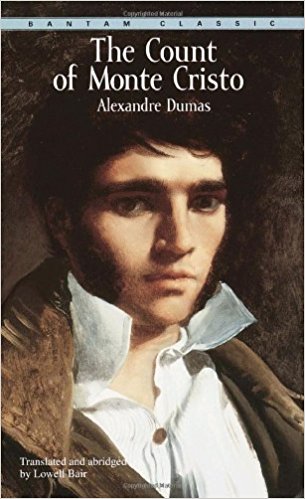 This is a guilty pleasure of mine. I have read it both in french and in english. The Count of Monte Cristo is a romantic thriller that strings you along the entire time. I read this book in one sitting the first time, because I couldn't stop. The plot twists and little mind games played between characters is done in such a way that you can guess and figure out what's going on but without feeling like it is cliche and obvious. I highly recommend this book on a beautiful summer day with enough time to finish it in one sitting.
This is a guilty pleasure of mine. I have read it both in french and in english. The Count of Monte Cristo is a romantic thriller that strings you along the entire time. I read this book in one sitting the first time, because I couldn't stop. The plot twists and little mind games played between characters is done in such a way that you can guess and figure out what's going on but without feeling like it is cliche and obvious. I highly recommend this book on a beautiful summer day with enough time to finish it in one sitting.
 Leonardo da Vinci is my hero. His ability to mix art and science is extraordinary. One thing that I admire is his belief that the natural world had a certain beautiful order to it that could be captured through mathematics and art. This belief pervaded everything he did and pushed forward his inventions and discoveries. Da Vinci inspires me to stay curious about the world, and to learn new things about just about anything.
Leonardo da Vinci is my hero. His ability to mix art and science is extraordinary. One thing that I admire is his belief that the natural world had a certain beautiful order to it that could be captured through mathematics and art. This belief pervaded everything he did and pushed forward his inventions and discoveries. Da Vinci inspires me to stay curious about the world, and to learn new things about just about anything.
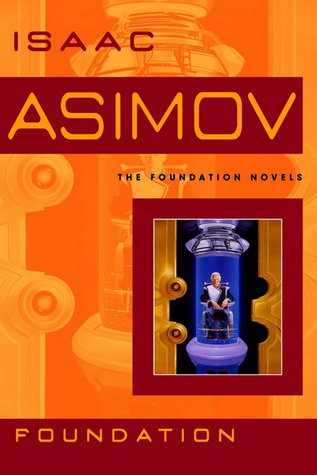 Asimov was a genius. He was centuries before his time. The way he was able to think about technologies and how they might change society is phenomenal. For example, he wrote about a fictional planet that found a way to keep the average lifespan of the inhabitants to be 300 years. He posited that this would change the horizon of their decisions. That is, if you live to 300, you might not start working untill you are 50 or 60, and choose to study longer. These type of realizations are amazing and they are everywhere in the worlds that Asimov created.
Asimov was a genius. He was centuries before his time. The way he was able to think about technologies and how they might change society is phenomenal. For example, he wrote about a fictional planet that found a way to keep the average lifespan of the inhabitants to be 300 years. He posited that this would change the horizon of their decisions. That is, if you live to 300, you might not start working untill you are 50 or 60, and choose to study longer. These type of realizations are amazing and they are everywhere in the worlds that Asimov created.